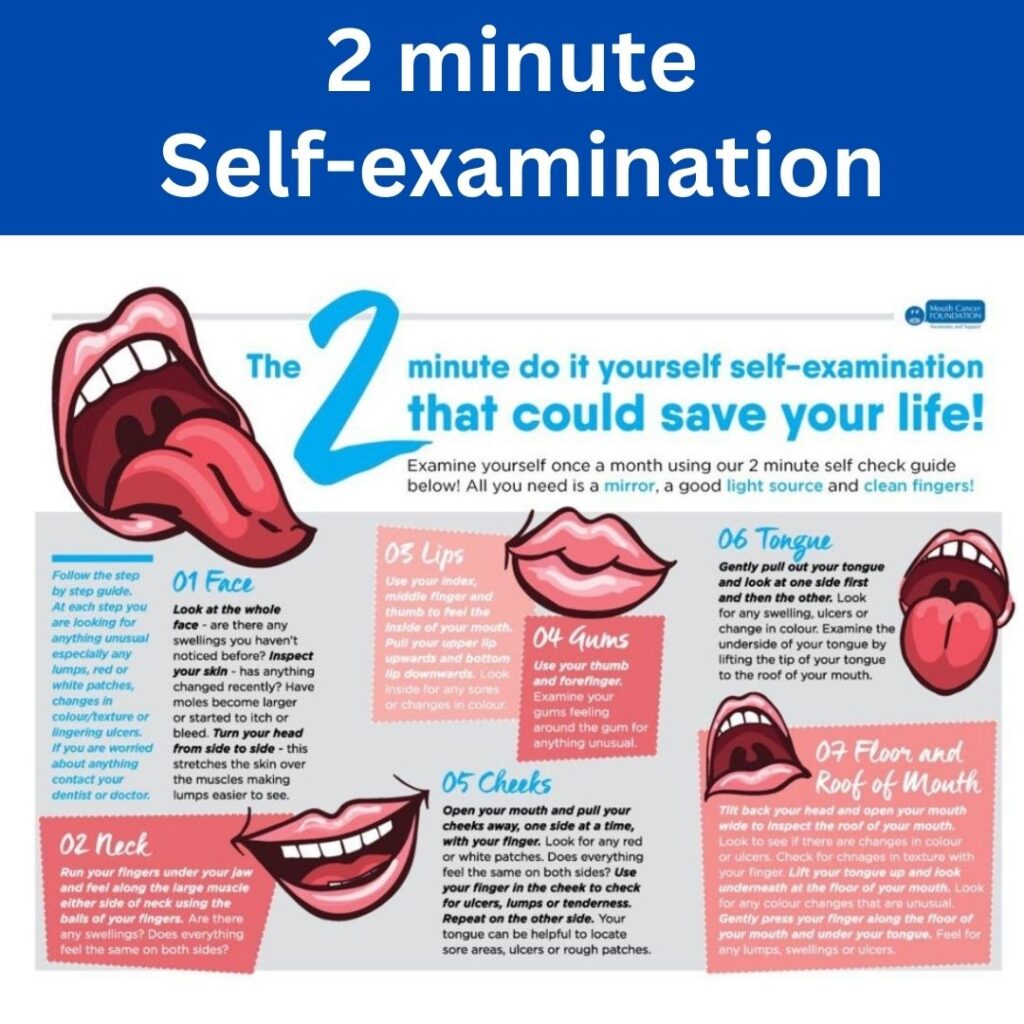April of each year is Oral Cancer Awareness Month.
It’s an effort from our side to raise public awareness about oral cancer through this blog. We are going to discuss
- The symptoms to look out for
- The importance of early detection and treatment
- Who is more prone to get oral cancer
- Various screening recommendations
- Methods of prevention
Keep reading this article to learn more about oral cancer during this awareness month to make the most of it.
It is more important than ever to take steps to protect yourself and your loved ones.
What is Oral cancer?
Oral cancer is cancer that can affect any part of the mouth. It can develop on any tissue including the tongue, lips, gums, and throat.
Signs and symptoms of oral cancer
The potential symptoms of oral cancer include:
- Red or white patches on your gums, tongue, or the inside of your cheek
- A lesion or sore in your mouth that does not go away
- Difficulty swallowing, chewing, or speaking
- Areas of numbness in your mouth
- A lump or thickening in your mouth or throat or on your lips that you can feel
- Persistent pain in your mouth
- A persistent earache
- Jaw swelling
- Sore throat that doesn’t go away
- Unexplained weight loss
- Swollen lymph nodes in your neck
If you notice any of these symptoms, it is important to see your dentist or doctor immediately as it can be oropharyngeal cancer.
Early detection is very important
Don’t wait- Early detection save lives.
Oral cancers are not diagnosed until they have reached an advanced stage and this is the reason for the high mortality rate from oral cancer. Early detection is key to successful treatment. The 5-year survival rate highly improves when oral cancer is detected and treated in its earlier stages. Early detection screening is available and is part of a regular dental check-up.
What causes oral cancer and who is at more risk?
Oral cancer occurs when cells in your mouth begin to grow and divide in an uncontrolled manner. The commonly affected cells are squamous cells that line the surfaces of your mouth. While the exact cause of oral cancer is unknown, several risk factors that can increase your chances of developing the disease. These include:
- Smoking or using tobacco products is the strongest risk factor for oral cancer. Chewing gutka that contains betel nut, tobacco, and spices also leads to oral cancer.
- Heavy alcohol consumption- Heavy drinkers are at 5 times more risk of getting oral and throat cancer.
- Exposure to HPV (Human papillomavirus)
- Poor diet and nutrition
- Being an older age- Most oral cancers happen after 40, the average age is 64 years.
- Being exposed to UV (ultraviolet) light- Excess exposure to UV from sunlight or tanning beds can boost the risk of cancer on lips.
- Being male- males are more prone to oral cancer.
- Chronic inflammation in the mouth
While some of these risk factors, such as age and gender, are beyond our control, there are steps we can take to reduce our risk of developing the illness.
Preventive measures for oral cancer
You can take steps to prevent oral cancer from developing:

- Avoiding tobacco products, including cigarettes, cigars, and chewing tobacco
- Alcohol consumption in moderation or not at all
- Eating a healthy and balanced diet, rich in fruits and vegetables
- Practicing good oral hygiene, including brushing and flossing regularly and visiting the dentist for regular checkups and cleanings
- Getting vaccinated against HPV
In addition to these preventive measures, there are also screening tests available to detect it early.
How often oral screening is recommended?
There is no official testing or screening program for oral cancer. However, your dentist or doctor can perform a screening during routine regular checkups once or twice a year. This involves a visual and physical examination of the mouth, lips, and throat to look for any abnormalities or signs of cancer. Some dentists use special dyes for patients who are at higher risk of oral cancer.
Have you carried out your mouth cancer self-check? The mouth cancer foundation recommends that you carry out your 2- minute self-examination once a month. You can follow the steps given in the picture below and then share it too to help raise awareness for oral cancer.

If it is detected, treatment will depend on the stage and location of cancer. Treatment options may include surgery, radiation therapy, chemotherapy, or a combination of these.
Takeaway
Oral Cancer Awareness Month is an important time to raise awareness about the risk factors, symptoms, and prevention of oral cancer. By taking steps to reduce our risk and by getting regular screenings, we can help prevent this serious disease and ensure early detection and successful treatment if it does occur.
The outlook for people with oral cancer is best when it’s detected and treated early. So it’s crucial to get regular dental checkups and be aware of any unusual changes in your mouth. If you notice something concerning, it’s high time to see a dentist or doctor.
This Oral Cancer Awareness Month, do yourself a favor and commit to taking care of your oral health.
If you are also looking for a dental clinic near me, regarding any issues of oral cancer, mouth ulcer, or any other dental issue, book your appointment at Shubham dental clinic, Hisar.

Excellent article
Thanks doctor.
Nice article